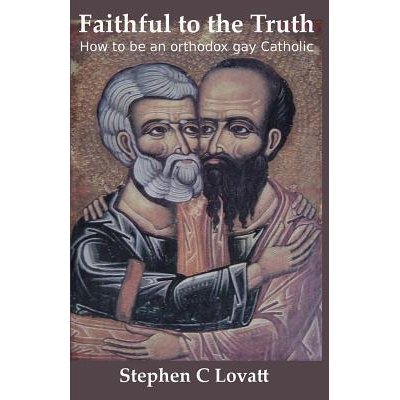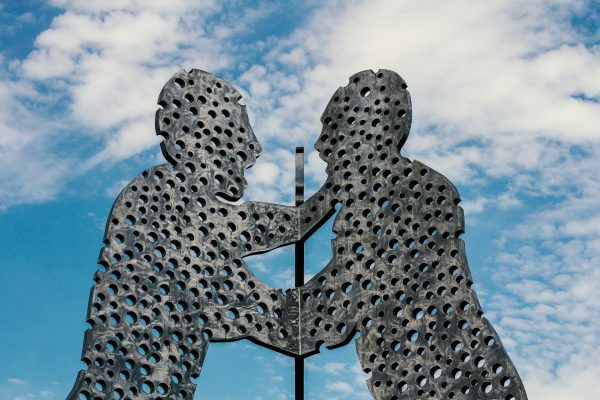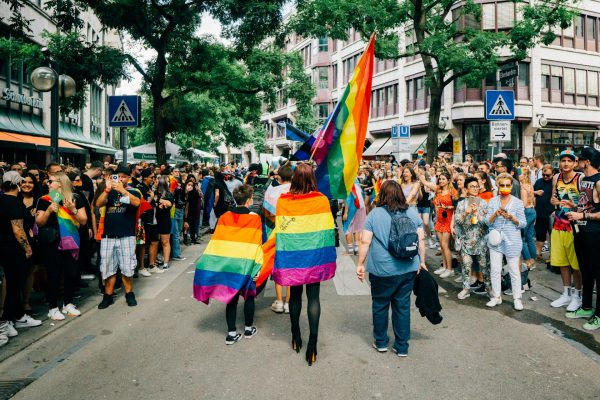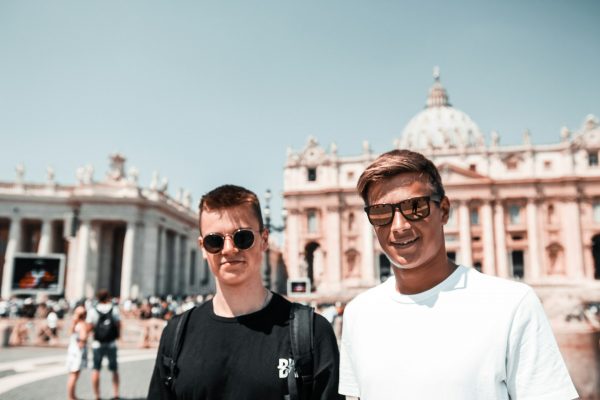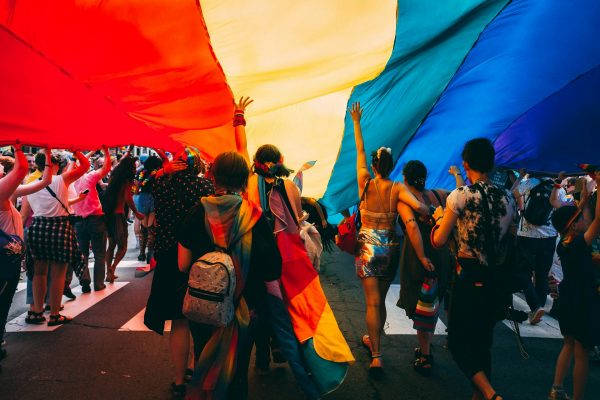Religion is sometimes a very difficult topic to touch on if you’re queer. For me being gay and having faith was a struggle of the conscience. From one side of the spectrum I heard all the horrible things that will happen to me for being gay and not following the Church. I grew up believing that if I wanted to believe in God, I would have to give up being whom I am. Then, I found Stephen Lovatt, author of “Faithful to the Truth.” Communicating with him across the pond has been a life-changing experience.
With our emails, I felt the need to know him on a more personal level. He’s from a time that being gay and belief in Christ wasn’t as divided as it was when I was growing up or how it is today. It wasn’t enough for me to read his bio. I wanted to know him better. I wanted to believe in a higher power other than me. I asked him a few questions to get to know him better.
Q) Growing up, how did you know that you were gay?
A) It wasn’t obvious to me at first: I had no such category to identify with. I knew quite early on in high school that I found male bodies interesting and that other boys of my age were more interested in female bodies. I could never understand why the other boys were obsessed with female breasts. I was attracted to a couple of girls, but all my closest friends – the people who I really cared for and about – were other boys. At University, I had a serious girlfriend, but we broke up because she couldn’t take my Catholicism seriously
Q) Who was your first love?
A) I fell deeply in love with my best friend from Church, Adrian, when I was 18. It was a very intense experience, intellectually and spiritually. I hung about with him at the Church youth group and young people’s fellowship. We had deep conversations about life and religion. At one point, he asked if I was gay and I denied it. He wasn’t interested in any kind of committed relationship, and became involved with a girl whom he subsequently married (they are now divorced) and I was heartbroken. I remember writhing in agony one night after being slighted, thinking that I now had some kind of idea of how Jesus must have felt during His passion. Much later on in my life I heard the song “Judas Kiss” by the Christian rock group “Stryper:” that says it all.
Q) When you followed a religion, what were the conflicts that you felt about being gay and a good Christian?
A) None until I was forced to “come out” during my time as a Ph.D. student at Bristol University, in 1992. Until then I mostly ignored the topic. I remember thinking that homosexuality simply couldn’t be as wicked as the Church would seem to want to have it, as there were so many homosexuals who had lived great lives and been exemplary human beings – sometimes despite persecution.
When I “came out” as gay my first reaction was that I had to become a devotee of Satan. I mean this seriously, not in jest. This was because the Church has it that gay folk are constitutionally oriented towards acts which are necessarily sinful – and seriously so. This makes homosexuals “utterly depraved” in the way that Luther taught that all human beings are, and which the Council of Trent emphatically rejected. Hence, it seemed that I was not one of God’s beloved creatures; but rather some kind of anomaly, owing a basic allegiance to wickedness rather than to righteousness.
A close Catholic friend, who was training to be a priest helped me to find a way forward and convinced me that I could remain a Catholic while self-identifying as gay. This man is still a close friend of mine and is a respected priest of the London Westminster diocese. Also, I met a priest of the Clifton (that is, Bristol) diocese, who was very helpful at the time. His name was Bosco McDonald. The last thing he said to me before I moved away from Bristol was: “Whatever happens, Stephen, maintain a dialogue with the Church.”
Coming out as gay was made easier for me by the fact that I already had a complex relationship with Church authority. Not long after becoming Catholic (in 1979, at Cambridge University), I came to the conclusion that the liturgical and doctrinal revolution which had been set in motion in the name of the Second Vatican Council was entirely misconceived and profoundly damaging to the Church. Hence, I became used to disagreeing on a fundamental level with almost every decision that issued from the Vatican and from popes Paul VI and John-Paul II; so when I was forced to dissent from much less authoritative teaching relating to homosexuality, I was inured to it. If I had not already become used to disagreeing with popes on important matters which were not personal, but purely doctrinal and liturgical, I don’t know how I would have coped with disagreeing with the Vatican when it came to such a personal matter as my own sexuality: where it could so easily be construed that I was guilty of wishful thinking and self-serving conceit.
Q) When you were working for your Ph.D. at Bristol: 1990 – 1993, you had a crush on a young man, to whom you later confessed your feelings.
A) It was this that forced me to “come out.” It was not a “crush,” however. I fell deeply in love with Paul Hammond: primarily on a spiritual level after he wrote a kind of love letter to me: “I love you, Steve. Even now my eyes are brimming with tears. You have been to me everything a Father could be – and more. Let us work together to make Heaven on Earth.” It had all started with me beginning to share my faith with him. To give you an idea of what went on between us, at one point Hammond wrote to me: “One thing that stops me from becoming a Catholic is that I’m afraid that if I did I’d be so grateful to you that I’d agree to have sex with you.”
Q) You mentioned your friends helping you. In what way did they help?
A) Various people – especially Paul Miller, who is now a Professor of Neuroscience – listened to me expressing my feelings and helped Paul Hammond and I to regularize our friendship (by acting as go-betweens) when some other influences (such as the University) were trying to destroy it. I will always be in Prof Miller’s debt for what he did for me. His loving, patient and compassionate support simply held me together emotionally when I would otherwise have fallen apart.
At one point a well-meaning (?), low-ranking University official expressed the view that Hammond and I could not possibly ever have anything to do with each other. In point of fact, Hammond and I became close friends again, and he eventually became a Catholic (in about 1996) as a result of my witness and pestering. Sadly, the last time we met was when I embraced him before the Altar of the Church of St Mary (Morefields, London), welcoming him to Catholic fellowship as his official “sponsor”. A few weeks before this I had had a presentiment that something bad was going to happen. When I gave him a box of books on theology and spirituality, saying to him: “in case something happens to me, you’ll have these to guide you”, I suddenly felt as if someone had walked over my grave. It was a very weird feeling. Shortly after Hammond was received into the Church, we had a row, over nothing too serious, and then various conservative Catholics – lay people and priests – contrived to prevent our reconciliation. I know that at least one priest told Hammond that he should have nothing to do with me, because I was gay.
Q) Were there other romances at the time?
A) Not really. I made a number of gay friends, and I was quite fond of the two of them. Then I met my present partner, David, in 1993, through a mutual friend. David is also a Catholic. We have been together now for twenty-two years; which has involved David almost dying of cancer and me being made redundant twice and our being forced to move where we live four times.
Q) Did you ever feel that the congregation accepted you as gay, but that you should not give into it?
A) No: because I generally keep my private life very private in a Church context, so there was nothing for anyone to accept. While still at Bristol, David and I were fairly open – but not demonstrative – about our relationship in the Catholic Cathedral’s parish there and no-one ever passed any negative comments. Quite the opposite, we were accepted, and I was allowed to start up a discipleship group – but this folded when David and I left Bristol for Southend-on-Sea.
Many years later, I encountered Rev McDonald again, as the parish priest of Cheltenham where I now live. By this time he had climbed the greasy pole and was a Canon – a senior priest adviser to the bishop of Clifton. I went to see him, offering my services to the parish as a volunteer and was rebutted, being told that I should not ever receive Holy Communion and that every Catholic priest would tell me the same thing. Canon MacDonald was subsequently promoted to administrator of the Cathedral parish – where I had first met him as a lowly assistant priest.
Q) Where most of your peers, gay and how did they feel about both Christianity and Homosexuality?
A) No, and very few had any views on this topic. I lost most of my “friends” at this time, but it isn’t clear how much that was to do with homophobia and how much to do with them not wanting to bother with someone who was in serious need of support. One close atheist friend was clearly homophobic, as he had once told me that he would never go back to a certain shoe-shop because he had decided that the sales assistant who had served him there was a homosexual and he didn’t want to be served by a queer.
The friends I lost were mostly non-Christians. David and I did make some friends via the “Lesbian and Gay Christian Movement.” They were all Protestants, however. I also joined “Quest” the gay Catholic group for a while; but I was made to feel very unwelcome, as my theological and liturgical ideas were much too orthodox and traditional for them to cope with. This was in spite of the fact that at one AGM of Quest I had led the successful opposition to an initiative from the (rather too “establishment-minded”) Committee to agree to support the Vatican’s official stance on homosexuality in return for the right to advertise in diocesan yearbooks.
Most gay Catholics are liberal and progressivist in their views. I don’t blame them for this. The general standard of Catholic doctrinal formation (via preaching and teaching) is abysmal these days and most Catholics are confused and disorientated about their faith. Gay Catholics generally think that once they’ve rejected one aspect of the Church’s official teaching this sets a precedent for rejecting everything else which they don’t understand or find uncongenial at first sight.
I did learn a lot from this experience of communicating with Stephen is that I could be gay or not, have faith or not, I would either be accepted or not. He had the courage to do more than others. The courage to write his books and show us how conflicting religion really is when it comes to being gay and believing in God.
To find out more about Stephen Lovatt, go to http://stephenlovatt.eu.pn/. You’ll be glad you did, maybe even a little more enlightened. I know I am.


